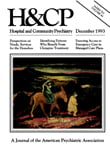Effectiveness of Two Methods for Informing Schizophrenic Patients About Neuroleptic Medication
Abstract
This study showed that both a single educational session and an educational review process were effective in increasingstable schizophrenic patients' knowledge about the side effects of neuroleptic medication. In addition, neither intervention resulted in clinical deterioration or decreased compliance.
Structured informing processes using printed information and a multiple-choice questionnaire have several advantages. Allowing patients to read the information while it isbeing read aloud facilitates learning. Physicians can use the standardized printed information form to document more precisely what was said to patients during the informed consent process. In addition, the printed information provides a core to which other educational materials may be added. The questionnaire can be used to assess which information should be reinforced. Printed information may also be translated into other languages, can be reviewed by patients at home, and can be shared with relatives and other advisers and support persons
Access content
To read the fulltext, please use one of the options below to sign in or purchase access.- Personal login
- Institutional Login
- Sign in via OpenAthens
- Register for access
-
Please login/register if you wish to pair your device and check access availability.
Not a subscriber?
PsychiatryOnline subscription options offer access to the DSM-5 library, books, journals, CME, and patient resources. This all-in-one virtual library provides psychiatrists and mental health professionals with key resources for diagnosis, treatment, research, and professional development.
Need more help? PsychiatryOnline Customer Service may be reached by emailing [email protected] or by calling 800-368-5777 (in the U.S.) or 703-907-7322 (outside the U.S.).



